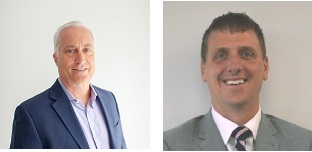An Interview with MidCap Business Credit’s Steven Samson and Seth Cooper
December 12, 2023
By Eileen Wubbe

Pictured: Steve Samson (Left) and Seth Cooper
Steven Samson, president, has been with MidCap for more than 10 years and is responsible for the oversight of all functions of the business. Steve has more than 30 years experience in commercial banking and asset-based lending including senior roles at People’s United Bank, GE Capital, and RBS Citizens Business Capital. Steve has also served in senior level risk roles with two start-up specialty finance companies. He is a director of the Secured Finance Network. Steve received his undergraduate degree in finance from the University of Connecticut and his juris doctor degree from Quinnipiac University School of Law.
Seth A. Cooper is senior vice president, sales manager, business development officer – Northeast, is responsible for new business development throughout the Northeast. He has spent the last 20 years building asset-based businesses for both large regional banks and independent commercial finance companies. He is a former board member of the CT Turnaround Management Association and is an active member of the Turnaround Management Association, the Association for Corporate Growth and the Secured Finance Network. Seth is a former SFNet 40 Under 40 Award Winner and received his undergraduate degree from Elon University.
Can you provide an overview of MidCap Business Credit and its core business services?
Steve: MidCap is an independently owned commercial finance company serving
the middle-market and lower middle-market sectors throughout North America. We
provide senior secured ABL credit facilities to businesses with revenue of $20MM to $200MM, with transaction sizes ranging from $3 million to $25 million.
What types of businesses does MidCap typically lend to, and what are the common financing needs you address for them? What specialized solutions do you offer?
Steve: We look at a broad spectrum of business – manufacturers, distributors, and service providers. But I think we are best known as a lender to the industrial space. We have the credit appetite and knowledge to lend against all business asset types including accounts receivable, inventory, equipment, and owner-occupied real estate. In fact, we prefer to be the principal senior lender in our borrowers’ capital structure rather than bring in a term loan provider.
Seth: Regarding financing needs and solutions, it’s almost always a liquidity issue. Our prospective borrowers are typically at an early stage in a turnaround, and often are in an exit stage with their bank lending relationship. In these situations, the decision to finance with MidCap usually comes down to whether we can generate sufficient availability for the bank to exit and for the business to complete its turnaround plan. We also structure
our deals with a very limited covenant package, typically just a minimum EBITDA requirement. And, if the business is not in a position to commit to an EBITDA level, we can structure the transaction with an availability hold as an alternative.
Can you discuss any specific industries or sectors where you’ve seen increased demand for financing solutions, and how MidCap is positioned to address these needs?
Steve: We’ve been particularly busy in the auto parts supplier industry. First it was the pressure the auto suppliers were under due to the OEM shutdowns during COVID, and then coming out of COVID they were faced with supply chain disruptions, material cost and labor rate increases, and exorbitant freight expense. Many of these businesses are still feeling the stress from these issues and are working closely with the OEMs to get through the situation and emerge as a stable supplier. At MidCap, we have a few trusted consultants in this sector that understand what is necessary for us to lend into a stressed situation, and they are critical to working with the OEMs to get what we need, and to negotiate on behalf of our borrowers for contract terms and support necessary for a long term supplier/customer relationship.
How has the combining of ABL and equipment finance in one organization proven to be an advantage in the market space?
Seth: While both businesses are serving the middle market, MidCap Equipment Finance’s focus is a little up-market from MidCap Business Credit. But that doesn’t mean we don’t see opportunities in each other’s markets. We sit in on each other’s pipeline calls and have open dialogue with MEF employees, and this has resulted in a number of cross-referrals. And there is overlap in our customer profiles as well – in fact, we’ve had a couple instances where MEF was able to provide more favorable equipment finance terms to an existing ABL client.
Steve: Aside from the front-end side of the business, we’ve been successful in leveraging our accounting and operations staff to serve Equipment Finance. We see further opportunities as we grow, particularly in the credit function of the business. And importantly, an expanding product offering allows for employee growth and attracting new talent. This is critical for small businesses, like us.
What sets MBC apart from other lenders and what advantage does your firm offer?
Steve: We are truly an independent firm owned by a hands-on investor that our senior
management team has worked with for more than a decade. We all know what types of deals we like to do, and we can make decisions quickly. It’s a flat organization and the people on the credit committee are the same people working on the deals. So, when we’re pitching a client, there’s confidence that we can deliver, and I think that resonates with our prospective borrowers.
Seth: We have a strong reputation in the market – not only for delivering at closing, but also in managing our relationships with borrowers. We’ve had some workouts in our portfolio over the years, and I can’t think of a situation where I couldn’t turn to a former client for a reference.
Can you discuss any upcoming initiatives of MidCap?
Steve: There’s a number of initiatives. First, continuing to grow and integrate MEF is an ongoing process. As they grow, we’re going to need to add headcount, but we need to do this with a long-term vision on how the two businesses will work together in the future. Second, we’ve been developing a new version of our home-grown loan accounting software that has had some major rollouts recently. This will be an ongoing project through much of 2024, but it’s already yielded substantial efficiencies in our operations department. And finally, we’re in the midst of increasing our credit line and expanding our bank group. We believe we’re in a market that’s poised to grow
over the next few years, and with our expanded line we’re confident we have the banking partners to support our growth.
What do you believe are the most significant challenges and opportunities facing the commercial lending industry in the coming years, and how is MidCap Business Credit positioning itself to navigate them?
Steve: The number one challenge that I think of is a hard recession. No one knows if/when it’s coming, so all we can do is be prepared for it. We structure our deals responsibly, we are in close contact with all our clients, and we diligently watch our collateral. That’s the only way we know how to prepare for it. Longer term, I definitely worry about regulations creeping down to our market, and I worry about bank regulations going too far and how that could impact our industry’s cost of capital
or even availability of capital. But, on the whole, we’re optimistic about the growth of the private direct lending market – particularly the market we serve. The cost of the traditional banking model is likely to continue to increase, making it less economic for them to manage middle-market / lower middle-market deals. MidCap is well positioned to serve this space.



.jpg?sfvrsn=f1093d2a_0)